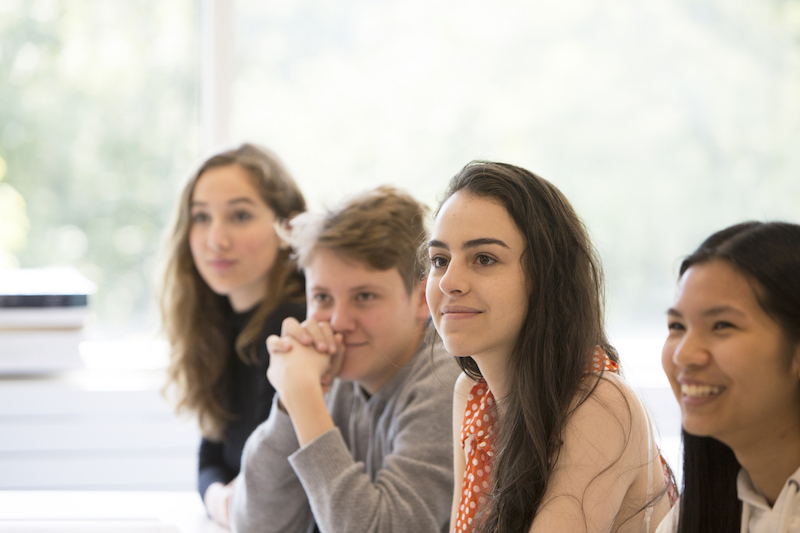When inspiration strikes! Investigating the student-led classroom
Posted on 15th Jul 2019 in School News, United States, Learning Styles
The traditional classroom usually involves a teacher, a white board and a lecture lasting around an hour. Students are required to maintain focus and occasionally, answer questions when asked. The student-led classroom couldn’t be a further departure from this. It relies on the students’ own interests; the direction of the lesson following wherever inspiration strikes in the moment. It focuses on the individual learner, their needs and perspectives, rather than the collective student body. Active participation is key in this kind of classroom model, but there’s also plenty more to investigate.
The student-led classroom is designed around the learner’s needs
No two learners are alike. Education should anticipate this diversity and seek to provide the best experience for as many students as possible. The traditional classroom simply isn’t equipped to manage individual learner needs, the result being a mismatch in student attainment with many students failing to reach their potential. The student-led classroom acknowledges this by providing a variety of learning experiences to ensure all students get the opportunity to thrive.
The student-led teaching at EF Academy extends beyond the four walls of the classroom with opportunities for physical, visual and social learning. Not only do our students get to live in a new country, but our specific campus locations each offer unique landscapes for experiential learning. Recently our New York students spent the day in the city to launch a new advisory program: MAPS (Mindfulness, Awareness, Perception and Skills). Sasha Levitt, Director of Experiential Learning at EF Academy New York, explains:
“EF Academy is an immersive atmosphere dedicated to experiential learning. By giving students the opportunity to explore the things they love, experiential education sets students up for success in college/university, their careers, and beyond. Not only does hands-on learning promote better awareness and understanding of core educational concepts, it also encourages students to consistently reflect on themselves and their world. Developing such well-rounded perspectives and having an acute understanding of how they fit into their communities, gives students a lifelong sense of curiosity and a commitment to ongoing self-development.”
Classrooms should be creative spaces for thought and discussion
The student-led classroom is built on the notion that as students become active participants in their own learning experience, they process and retain information in a way that is proven more effective long-term. One of the best ways to generate engagement is simply to give students a voice in the classroom. By opening up the conversation, classrooms become the kind of creative hubs of activity that really inspire.
At EF Academy, our teachers are committed to creating a classroom that facilitates discussion and engagement. The traditional lecture is replaced by two-way communication, with both student and teacher contributing to the learning experience. Jenna Marcus, IGCSE coordinator & IB English Literature Teacher from our New York campus, expands on this through her use of the Socratic Method:
“My classes are very student-centered and I usually use a ‘Socratic method’ which is based on the students’ discussions and inquiries. It’s really a back and forth between them and I facilitate. I also use group activity where students collaborate and support one another. I offer extra help too, where I’ll work with a student individually. I’m constantly checking their level of understanding; if they don’t understand, then the lesson completely changes so that I can make sure that they get it”.
Teachers lead, coach and inspire learners to find passion in their subject matter
Teachers who take time to coach students one on one can learn more about what motivates each learner, what they find difficult, and also what they can bring to the classroom. Daniel Paccione, Head of University Advising & IB Coordinator at EF Academy New York, explains:
“The internationalism here at EF Academy really does enhance the curriculum by allowing students to use their culture and their perspectives to inform their studies and share their experience with other students.”
Every student has a unique experience to contribute and by allowing space for this, subjects become richer and more tangible in the eyes of each learner. Allowing a student to see their place within a topic or area of study, can also impassion them to take a greater interest and to feel the real-world relevance of their learning efforts.
Failure is recognized as a powerful teachable moment
In the traditional classroom model, there is little room for feedback or individual support. Students aren’t challenged to apply their knowledge until given homework, and often this only receives a grade without comment. A student-led classroom should instead seek to provide continual assessment and feedback. Every topic which proves difficult becomes an opportunity for support and guidance. Marcus explains:
“We’re not just teachers, we’re also this additional support. I love making a connection with the students because they’re not just receptacles of information, but they’re people and I want to help them grow as people, as well as learners.”
It’s now more important than ever for schools to provide a learning environment that empowers and supports young people. The student-led classroom encourages independent thought, builds confidence and nourishes academic curiosity. By allowing inspiration to strike in the classroom, students become better, more invested learners.
EF Academy International Boarding Schools opens a world of opportunities for high school students by providing them with a transformational education abroad, thorough preparation for university and a future that knows no borders. Students at our international boarding schools in New York (US), Pasadena (US) and Oxford (UK) enjoy modern campus facilities, experienced teachers and internationally recognized academic programs. Our graduates are globally-minded, collaborative, creative and critical thinkers ready to thrive in university and beyond.